The Employment Non-Discrimination Act (ENDA) is legislation proposed in the United States Congress that would prohibit discrimination in hiring and employment on the basis of sexual orientation or, depending on the version of the bill, gender identity, by employers with at least 15 employees.
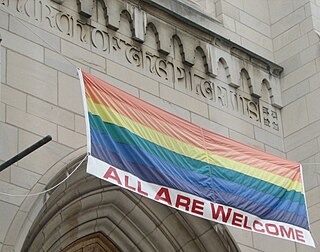
Gay-friendly or LGBT-friendly places, policies, people, or institutions are those that are open and welcoming to gay or LGBT people. They typically aim to create an environment that is supportive, respectful, and non-judgmental towards the LGBT community. The term "gay-friendly" originated in the late 20th century in North America, as a byproduct of a gradual implementation of gay rights, greater acceptance of LGBT people in society, and the recognition of LGBT people as a distinct consumer group for businesses.

The rights of lesbian, gay, bisexual, and transgender (LGBT) people in the U.S. state of Utah have significantly evolved in the 21st century. Protective laws have become increasingly enacted since 2014, despite the state's reputation as socially conservative and highly religious. Utah's anti-sodomy law was invalidated in 2003 by Lawrence v. Texas, and fully repealed by the state legislature in 2019. Same-sex marriage has been legal since the state's ban was ruled unconstitutional by federal courts in 2014. In addition, statewide anti-discrimination laws now cover sexual orientation and gender identity in employment and housing, and the use of conversion therapy on minors is prohibited. In spite of this, there are still a few differences between the treatment of LGBT people and the rest of the population, and the rights of transgender youth are restricted.

Lesbian, gay, bisexual, and transgender (LGBT) rights in the Republic of Ireland are regarded as some of the most progressive in Europe and the world. Ireland is notable for its transformation from a country holding overwhelmingly conservative attitudes toward LGBT issues, in part due to the opposition by the Roman Catholic Church, to one holding overwhelmingly liberal views in the space of a generation. In May 2015, Ireland became the first country to legalise same-sex marriage on a national level by popular vote. The New York Times declared that the result put Ireland at the "vanguard of social change". Since July 2015, transgender people in Ireland can self-declare their gender for the purpose of updating passports, driving licences, obtaining new birth certificates, and getting married. Both male and female expressions of homosexuality were decriminalised in 1993, and most forms of discrimination based on sexual orientation are now outlawed. Ireland also forbids incitement to hatred based on sexual orientation. Article 41 of the Constitution of Ireland explicitly protects the right to marriage irrespective of sex.
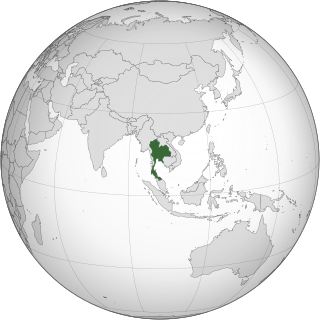
Lesbian, gay, bisexual, and transgender (LGBT) people in Thailand have several but not all of the same rights as non-LGBT people. Both male and female types of same-sex sexual activity are legal in Thailand, and same-sex marriage rights within the nation are pending legalisation. About eight percent of the Thai population, five million people, are thought to be in the LGBT demographic.
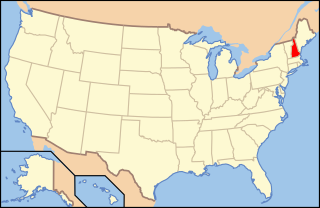
Lesbian, gay, bisexual, and transgender (LGBT) people in the U.S. state of New Hampshire enjoy the same rights as non-LGBT people, with most advances in LGBT rights occurring in the state within the past two decades. Same-sex sexual activity is legal in New Hampshire, and the state began offering same-sex couples the option of forming a civil union on January 1, 2008. Civil unions offered most of the same protections as marriages with respect to state law, but not the federal benefits of marriage. Same-sex marriage in New Hampshire has been legally allowed since January 1, 2010, and one year later New Hampshire's civil unions expired, with all such unions converted to marriages. New Hampshire law has also protected against discrimination based on sexual orientation since 1998 and gender identity since 2018. Additionally, a conversion therapy ban on minors became effective in the state in January 2019. In effect since January 1, 2024, the archaic common-law "gay panic defence" was formally abolished; by legislation implemented within August 2023.

Lesbian, gay, bisexual, and transgender (LGBT) people in the U.S. state of Wyoming may face some legal challenges not experienced by non-LGBT residents. Same-sex sexual activity has been legal in Wyoming since 1977, and same-sex marriage was legalized in the state in October 2014. Wyoming statutes do not address discrimination on the basis of sexual orientation and gender identity; however, the U.S. Supreme Court's ruling in Bostock v. Clayton County established that employment discrimination against LGBT people is illegal under federal law. In addition, the cities of Jackson, Casper, and Laramie have enacted ordinances outlawing discrimination in housing and public accommodations that cover sexual orientation and gender identity.
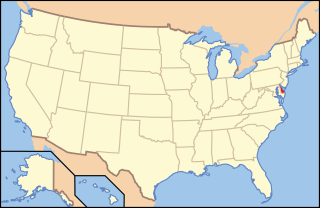
Lesbian, gay, bisexual, and transgender (LGBT) people in the U.S. state of Delaware enjoy the same legal protections as non-LGBT people. Same-sex sexual activity has been legal in Delaware since January 1, 1973. On January 1, 2012, civil unions became available to same-sex couples, granting them the "rights, benefits, protections, and responsibilities" of married persons. Delaware legalized same-sex marriage on July 1, 2013.

Lesbian, gay, bisexual, and transgender (LGBT) people in the U.S. state of New Jersey have the same legal rights as non-LGBT people. LGBT individuals in New Jersey enjoy strong protections from discrimination, and have had the same marriage rights as heterosexual people since October 21, 2013.

Lesbian, gay, bisexual, and transgender (LGBT) people in the U.S. state of Georgia enjoy most of the same rights and liberties as non-LGBT people. LGBT rights in the state have been a recent occurrence, with most improvements occurring from the 2010s onward. Same-sex sexual activity has been legal since 1998, although the state legislature has not repealed its sodomy law. Same-sex marriage has been legal in the state since 2015, in accordance with Obergefell v. Hodges. In addition, the state's largest city Atlanta, has a vibrant LGBT community and holds the biggest Pride parade in the Southeast. The state's hate crime laws, effective since June 26, 2020, explicitly include sexual orientation.
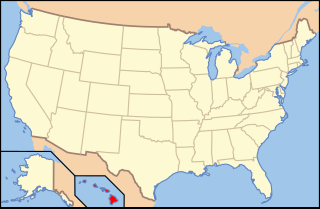
Lesbian, gay, bisexual, and transgender (LGBT) people in the U.S. state of Hawaii enjoy the same rights as non-LGBT people. Same-sex sexual activity has been legal since 1973; Hawaii being one of the first six states to legalize it. In 1993, a ruling by the Hawaiʻi Supreme Court made Hawaii the first state to consider legalizing same-sex marriage. Following the approval of the Hawaii Marriage Equality Act in November 2013, same-sex couples have been allowed to marry on the islands. Additionally, Hawaii law prohibits discrimination on the basis of both sexual orientation and gender identity, and the use of conversion therapy on minors has been banned since July 2018. Gay and lesbian couples enjoy the same rights, benefits and treatment as opposite-sex couples, including the right to marry and adopt.

Lesbian, gay, bisexual, and transgender (LGBT) people in the U.S. state of Oregon have the same legal rights as non-LGBT people. Same-sex sexual activity is legal in Oregon, and same-sex marriage has been legal in the state since May 2014 when a federal judge declared the state's ban on such marriages unconstitutional. Previously, same-sex couples could only access domestic partnerships, which guaranteed most of the rights of marriage. Additionally, same-sex couples are allowed to jointly adopt, and discrimination based on sexual orientation and gender identity in the areas of employment, housing and public accommodations is outlawed in the state under the Oregon Equality Act, enacted in 2008. Conversion therapy on minors is also illegal.
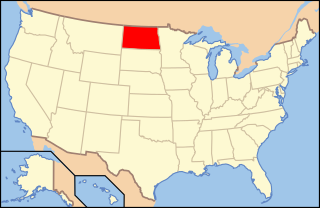
Lesbian, gay, bisexual, and transgender (LGBT) people in the U.S. state of North Dakota may face some legal challenges not experienced by non-LGBT residents. Same-sex sexual activity is legal in North Dakota, and same-sex couples and families headed by same-sex couples are eligible for all of the protections available to opposite-sex married couples; same-sex marriage has been legal since June 2015 as a result of Obergefell v. Hodges. State statutes do not address discrimination on account of sexual orientation or gender identity; however, the U.S. Supreme Court's ruling in Bostock v. Clayton County established that employment discrimination against LGBT people is illegal under federal law.

Lesbian, gay, bisexual, and transgender (LGBT) people in the U.S. state of Nebraska may face some legal challenges not experienced by non-LGBT residents. Same-sex sexual activity is legal in Nebraska, and same-sex marriage has been recognized since June 2015 as a result of Obergefell v. Hodges. The state prohibits discrimination on account of sexual orientation and gender identity in employment and housing following the U.S. Supreme Court's ruling in Bostock v. Clayton County and a subsequent decision of the Nebraska Equal Opportunity Commission. In addition, the state's largest city, Omaha, has enacted protections in public accommodations.
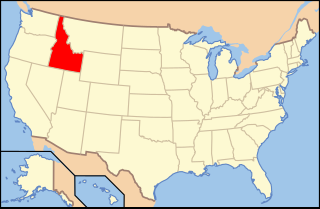
Lesbian, gay, bisexual and transgender (LGBT) people in the U.S. state of Idaho face some legal challenges not experienced by non-LGBT people. Same-sex sexual activity is legal in Idaho, and same-sex marriage has been legal in the state since October 2014. State statutes do not address discrimination based on sexual orientation and gender identity; however, the U.S. Supreme Court's ruling in Bostock v. Clayton County established that employment discrimination against LGBT people is illegal under federal law. A number of cities and counties provide further protections, namely in housing and public accommodations. A 2019 Public Religion Research Institute opinion poll showed that 71% of Idahoans supported anti-discrimination legislation protecting LGBT people, and a 2016 survey by the same pollster found majority support for same-sex marriage.

Lesbian, gay, bisexual, and transgender (LGBT) people in the U.S. state of Alaska may face some legal challenges not experienced by non-LGBT Alaskans. Since 1980, same-sex sexual conduct has been allowed, and same-sex couples can marry since October 2014. The state offers few legal protections against discrimination on the basis of sexual orientation and gender identity, leaving LGBT people vulnerable to discrimination in housing and public accommodations; however, the U.S. Supreme Court's ruling in Bostock v. Clayton County established that employment discrimination against LGBT people is illegal under federal law. In addition, four Alaskan cities, Anchorage, Juneau, Sitka and Ketchikan, representing about 46% of the state population, have passed discrimination protections for housing and public accommodations.

LGBT employment discrimination in the United States is illegal under Title VII of the Civil Rights Act of 1964; employment discrimination on the basis of sexual orientation or gender identity is encompassed by the law's prohibition of employment discrimination on the basis of sex. Prior to the landmark cases Bostock v. Clayton County and R.G. & G.R. Harris Funeral Homes Inc. v. Equal Employment Opportunity Commission (2020), employment protections for LGBT people were patchwork; several states and localities explicitly prohibit harassment and bias in employment decisions on the basis of sexual orientation and/or gender identity, although some only cover public employees. Prior to the Bostock decision, the Equal Employment Opportunity Commission (EEOC) interpreted Title VII to cover LGBT employees; the EEOC determined that transgender employees were protected under Title VII in 2012, and extended the protection to encompass sexual orientation in 2015.

In the U.S. Virgin Islands, Lesbian, gay, bisexual, and transgender (LGBT) rights have evolved substantially in recent years. Same-sex sexual activity has been legal since 1985. The region also provides explicit legal protections against discrimination for LGBT residents since December 2022. Following the Supreme Court's ruling in Obergefell v. Hodges on June 26, 2015, which found the denial of marriage rights to same-sex couples unconstitutional, same-sex marriage became legal in the islands.
This is a list of notable events in the history of LGBT rights that took place in the year 2015.

















